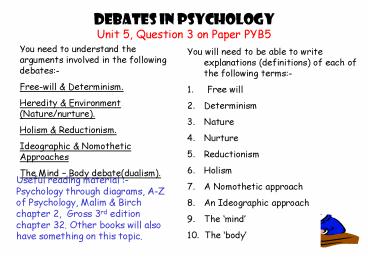Debates in Psychology
1 / 9
Title: Debates in Psychology
1
Debates in Psychology
Unit 5, Question 3 on Paper PYB5
You need to understand the arguments involved in
the following debates- Free-will
Determinism. Heredity Environment
(Nature/nurture). Holism Reductionism. Ideograph
ic Nomothetic Approaches The Mind Body
debate(dualism).
You will need to be able to write explanations
(definitions) of each of the following
terms- 1. Free will 2. Determinism 3.
Nature 4. Nurture 5. Reductionism 6.
Holism 7. A Nomothetic approach 8. An
Ideographic approach 9. The mind 10. The
body
Useful reading material - Psychology through
diagrams, A-Z of Psychology, Malim Birch
chapter 2, Gross 3rd edition chapter 32. Other
books will also have something on this topic.
2
Free will vs Determinism
Free will- People have control over and are able
to choose how they act.
Determinism- Behaviour is determined by external
and/or internal factors acting upon the
individual, which are beyond the individuals
control.
Debate- Is human behaviour determined or the
result of free will ? Can we choose to act as we
will or is our behaviour caused by influences
beyond our control?
3
We normally think of people as being in control
of their behaviour, mental disorders represent an
important exception to this rule e.g.
Tourettes syndrome Tim is 14 and shows a variety
of twitches and tics. His hear sometimes jerks
and he often blinks and grimaces. Most surprising
is that occasionally he blurts out words, usually
vulgarities. He does not mean to do it, and he is
embarrassed by it, but he cannot control it.
Because of his strange behaviour, most other
children avoid him. His isolation and
embarrassment are interfering with his social
development. (Holmes, 1994)
The legal / criminal justice system assumes
people are responsible for their own actions
4
Arguments for and against Free-will
- Against-
- Evidence for free-will is mostly subjective
according to Valentine(1992) subjective
impressions are unreliable do not guarantee
truth, however firmly they are held. - Free-will is difficult to define (Valentine,1992)
therefore it is difficult to give a coherent
account of the concept. - Difficult to identify what does the choosing -
the non-physical soul/spirit (Descartes) or the
product of consciousness (Sartre). - A pure free-will approach goes against the
deterministic laws of science, which assumes that
events in the world are not random but ordered
determined, this makes it difficult to justify
the scientific approach to studying human
behaviour.
- For-
- Personal responsibility assumes freedom of
choice. - Introspection on our own decisions seem to
indicate free choice, often there are several,
options. - People feel they have freedom of choice
- Rotter(1966) locus of control stress.
- Westcott(1982) investigated subjective feelings
of free-will - Brehem(1966) people react when they feel their
freedom is threatened.
5
What is meant by Determinism?
- Determinisms is based on the theories of
philosophers Locke, Berkeley Hume. - Biological determinism internal causes of
behaviour e.g. a biological need state (thirst,
hunger). Genetic influences (genetic
determinism). Sociobiology (Wilson) explanation
of behaviour in terms of evolutionary factors
(via genes).
- Environmental determinism external causes of
behaviour e.g. learning experiences, stimuli in
the environment.
- Determinism assumes behaviour is orderly and
obeys laws, and so is explainable and
predictable. - If behaviour is predictable , then it is also
controllable by arranging circumstances in order
to get the desired reaction.
- Determinism removes the idea of responsibility
for ones own behaviour. Criminal or benevolent
acts are not the result of free choice and so the
notion of blame (punishment) or praise (reward)
are pointless. Imprisonment would only be seen as
useful if the aim was to provide new learning
opportunities therefore produce more socially
desirable behaviour.
6
Arguments for and against Determinism
- For-
- Compatible with science, in fact science is based
upon determinism. - Science is a successful route to knowledge.
- Therefore, determinism seems to make sense, it
does what it sets out to do it has face
validity. - It would therefore be seen by some, as an ideal
way of discovering about human behaviour.
- Against-
- It is false to assume that accurate predictions
are possible even physicists build uncertainty
factors into their laws. (If physicists have
this problem how much more of a problem this will
be for psychologists with their notoriously
unpredictable subject matter human behaviour). - Determinism is unfalsifiable. If a cause for a
behaviour can not be found, it is thought that
the cause simply has not yet been discovered (not
that one doesnt exist). - The assumption that one can ever arrive at a
complete description of the current state of a
person is probably false. By the time the state
has been determined, the person will probably
have moved on and changed once again.
7
So, Free-will or Determinism?
- Soft determinism proposed by W. James(1890)-
- James believed in a compromise between extreme
free-will and determinism. - Behaviour is determined by external / internal
forces but only to some extent. - It assumes an active role of the individual.
- Free will is not freedom from causation (e.g.
genetic, physiological, environmental factors)
but freedom from coercion and constraint. - If our actions are voluntary and in line with our
conscious desired goals, then they are free.
e.g. - handing over 100 to a charity free will.
- handing over 100 to a gunman coercion
- A Beautiful Mind John Nash famous
mathematician who suffered from schizophrenia
chose to ignore the hallucinations delusions
that his biology presented him with, in order
to remain in society. His wifes love support
helped him to do this.
8
Where do the five approaches in psychology stand
in the Free-will vs Determinism debate?
9
Continued. . .































![Download Book [PDF] What The Hell Are They Thinking? : The 100 debates that govern your life,](https://s3.amazonaws.com/images.powershow.com/10069142.th0.jpg?_=20240701052)